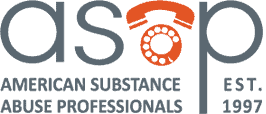ASAP, American Substance Abuse Professionals, supplies drug and alcohol testing, evaluation, treatment compliance monitoring and follow-up testing programs for employers who have drug and alcohol testing requirements for their employees. ASAP specializes in providing these services to employers whose testing programs are regulated by the Department of Transportation (DOT).
Participants, employees with positive drug/alcohol tests, must successfully comply with the requirements of their employer’s, or DOT’s, testing policies in order to keep their jobs or to become eligible for new employment. These “return-to-duty programs” are rigorous, intensive and extensive. As a result, ASAP success rates are extraordinarily high, routinely falling in the 85%-90% range. By comparison, national rates, as reported by SAMHSA (Substance Abuse and Mental Health Services Administration), typically hover at 35%-45%.
We, at ASAP, have long recognized that the return-to-duty programs we manage for our client companies are highly successful because they adhere to a “carrot and stick” design. Participants get to keep their jobs or become eligible for new ones if they are compliant with recommendations made by a program clinical specialist, the Substance Abuse Professional (SAP). They lose jobs and opportunities for new employment when they are non-compliant. Of course, they can start over if they wish. The salient point is that the return-to-duty process applies a strategic system of rewards and punishments that motivate and guide participants to recovery success. Participants succeed because they are incentivized to succeed.
ASAP, in 2009, began collaboration with the Johns Hopkins University Center for Learning and Health (CLH). The CLH, under the direction of Kenneth Silverman, Ph.D., is a leading center for the study of the use of incentive interventions in the treatment of substance use disorders (SUDs). In particular, the CLH is interested in investigating the use of employment as an incentive to motivate abstinence. To this end, they created the Therapeutic Workplace, a program where drug addicted participants could be employed, acquire job skills and receive monetary rewards that are contingent upon the results of drug testing. Contingency Management is the actual name for this kind of approach for modifying behavior used by the Therapeutic Workplace. Numerous randomized controlled studies have found the Therapeutic Workplace to be a remarkably successful treatment intervention. In 2014, it was recognized by the White House Office of National Drug Control Policy as an important innovation in the treatment of drug addiction.
The CLH Therapeutic Workplace establishes abstinence and prepares participants for work in the “real world”. ASAP was tapped to provide testing and case management when participants “graduate” from the Therapeutic Workplace and enter the real-world workforce. The Hopkins CLH, with ASAP collaboration, has been awarded three NIH (National Institutes of Health) grants to date, with more on the way. This article, The Therapeutic Utility of Employment in Treating Drug Addiction: Science to Application, supplies an overview of the history, current progress and future directions for research in this exciting area. ASAP is proud to play a role in the development of this promising mode of intervention. Read More




